On 19th November, Ayman Odeh took to Israel’s Knesset podium, with a stony-faced Netanyahu in the audience. “In Gaza there are 17,385 babies that your system has killed,” the leader of Hadash, a left-wing Arab-Jewish party, thundered. “Mr Netanyahu, what is your vision? For over 30 years, you’ve been a serial killer of peace.” Footage then shows the Knesset speaker ordering security guards to remove Odeh, a Palestinian citizen of Israel, from the room. Some words are unacceptable here, the speaker is heard saying, and “‘serial killer’ is one of them”.
When I met Odeh at the end of October, he had just addressed a far friendlier audience. At a Jewish community centre in north London, the 49-year-old spoke at a conference organised by Israel’s Haaretz newspaper. In English that was clearly a strain, the former lawyer urged the UK to help bring an “immediate end” to the Gaza war, and secure a hostage release deal, “by ending all military, financial and diplomatic support of the Netanyahu government’s war crimes.” The crowd of mostly British Jews clapped periodically.
“I don’t want to spend my days visiting more houses of mourning,” he said, smart in a navy suit and blue and red tie. The lawmaker evinced compassion for all those hurt since 7th October, something he has done repeatedly, to oft-deaf Israeli ears, after that terrible day. But most importantly perhaps, he had offered up hope: Israeli Jews and Palestinians could work together for peace, for a Palestinian state. In the café, waiting to start our interview, it was clear that, if not in the Knesset, here at least Odeh was among fans. “Congratulations on the English!”, one enthused, “What a speech!”
Odeh became leader of Hadash in 2015. The previous year, Israel had raised the electoral threshold to 3.25 per cent, a change which threatened the parliamentary representation of Palestinian citizens who make up 20 per cent of Israel’s population. Hadash brokered an agreement with Israel’s major Arab parties to run on one slate, thus ensuring all made it past the threshold. With Odeh at its head, the Joint List won 13 seats in the 2015 election, becoming the third-largest party in the Knesset.
On the day of that election, Netanyahu broadcast a video on social media warning that “the Arabs are moving in droves to the polling stations. Left-wing organisations are bussing them in.” Such delegitimisation is “in Netanyahu’s DNA”, Odeh tells me. In 1996, the year after the assassination of former prime minister Yitzhak Rabin by a Jewish extremist, Netanyahu ran on the slogan that he was “good for the Jews”. When Rabin’s minority government relied on Arab members of the Knesset, Netanyahu, then opposition leader, decried the government as illegitimate.
Palestinian lawmakers in Israel have long been demonised as a fifth pillar, supporters of terrorism, Odeh included. After elections in 2019, the Joint List begrudgingly recommended Benny Gantz as prime minister (under the rules of Israel’s proportional representation system) because he was the only alternative to Netanyahu. But Gantz—a centrist, at least in Israeli terms, and a former IDF chief of staff—“didn’t want to meet with us, he only wanted our recommendation,” recalls Odeh.
The Joint List has since disbanded, riven by disagreements. Odeh and his peers have been criticised for letting ego dictate politics. In 2021, it was the Islamist party Ra’am, which had left the Joint List, that became the first independent Arab party to join an Israeli government. Mansour Abbas, the party’s leader, was crowned “kingmaker” that year. Here, Odeh says, Netanyahu also worked to divide: “In order to split us, Netanyahu wove together a deal with Ra’am.”
Much has happened since we met, including an Israel-Lebanon ceasefire, but there has been no such progress in Gaza. Odeh believes the future depends on centre-left and Palestinian collaboration. “I have a slogan,” he says: “we are Arabs. Alone we can’t [do it], we are only 20 per cent, but without us it’s impossible. You can’t beat the right without us.”













